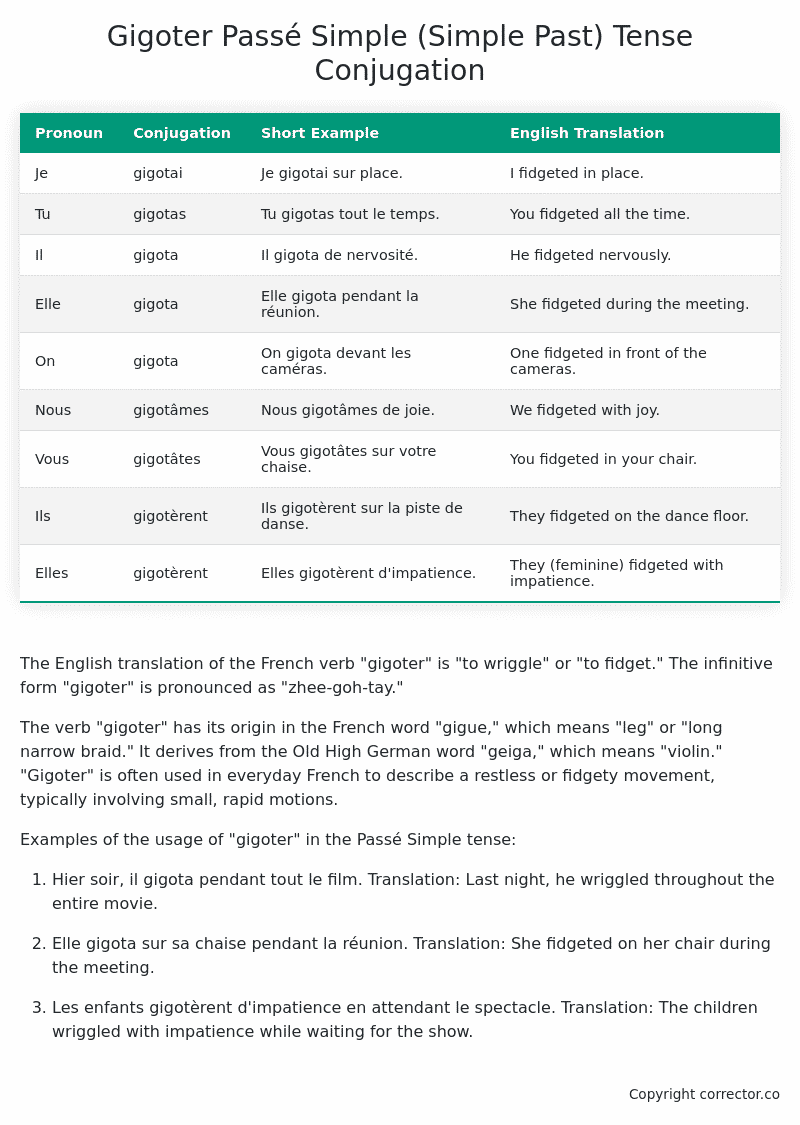Passé Simple (Simple Past) Tense Conjugation of the French Verb gigoter
Introduction to the verb gigoter
The English translation of the French verb “gigoter” is “to wriggle” or “to fidget.” The infinitive form “gigoter” is pronounced as “zhee-goh-tay.”
The verb “gigoter” has its origin in the French word “gigue,” which means “leg” or “long narrow braid.” It derives from the Old High German word “geiga,” which means “violin.” “Gigoter” is often used in everyday French to describe a restless or fidgety movement, typically involving small, rapid motions.
Examples of the usage of “gigoter” in the Passé Simple tense:
-
Hier soir, il gigota pendant tout le film.
Translation: Last night, he wriggled throughout the entire movie. -
Elle gigota sur sa chaise pendant la réunion.
Translation: She fidgeted on her chair during the meeting. -
Les enfants gigotèrent d’impatience en attendant le spectacle.
Translation: The children wriggled with impatience while waiting for the show.
Table of the Passé Simple (Simple Past) Tense Conjugation of gigoter
| Pronoun | Conjugation | Short Example | English Translation |
|---|---|---|---|
| Je | gigotai | Je gigotai sur place. | I fidgeted in place. |
| Tu | gigotas | Tu gigotas tout le temps. | You fidgeted all the time. |
| Il | gigota | Il gigota de nervosité. | He fidgeted nervously. |
| Elle | gigota | Elle gigota pendant la réunion. | She fidgeted during the meeting. |
| On | gigota | On gigota devant les caméras. | One fidgeted in front of the cameras. |
| Nous | gigotâmes | Nous gigotâmes de joie. | We fidgeted with joy. |
| Vous | gigotâtes | Vous gigotâtes sur votre chaise. | You fidgeted in your chair. |
| Ils | gigotèrent | Ils gigotèrent sur la piste de danse. | They fidgeted on the dance floor. |
| Elles | gigotèrent | Elles gigotèrent d’impatience. | They (feminine) fidgeted with impatience. |
Other Conjugations for Gigoter.
Le Present (Present Tense) Conjugation of the French Verb gigoter
Imparfait (Imperfect) Tense Conjugation of the French Verb gigoter
Passé Simple (Simple Past) Tense Conjugation of the French Verb gigoter (You’re reading it right now!)
Passé Composé (Present Perfect) Tense Conjugation of the French Verb gigoter
Futur Simple (Simple Future) Tense Conjugation of the French Verb gigoter
Futur Proche (Near Future) Tense Conjugation of the French Verb gigoter
Plus-que-parfait (Pluperfect) Tense Conjugation of the French Verb gigoter
Passé Antérieur (Past Anterior) Tense Conjugation of the French Verb gigoter
Futur Antérieur (Future Anterior) Tense Conjugation of the French Verb gigoter
Subjonctif Présent (Subjunctive Present) Tense Conjugation of the French Verb gigoter
Subjonctif Passé (Subjunctive Past) Tense Conjugation of the French Verb gigoter
Subjonctif Imparfait (Subjunctive Imperfect) Tense Conjugation of the French Verb gigoter
Subjonctif Plus-que-parfait (Subjunctive Pluperfect) Tense Conjugation of the French Verb gigoter
Conditionnel Présent (Conditional Present) Tense Conjugation of the French Verb gigoter
Conditionnel Passé (Conditional Past) Tense Conjugation of the French Verb gigoter
Conditionnel Passé II (Conditional Past II) Tense Conjugation of the French Verb gigoter
L’impératif Présent (Imperative Present) Tense Conjugation of the French Verb gigoter
L’impératif Passé (Imperative Past) Tense Conjugation of the French Verb gigoter
L’infinitif Présent (Infinitive Present) Tense Conjugation of the French Verb gigoter
L’infinitif Passé (Infinitive Past) Tense Conjugation of the French Verb gigoter
Le Participe Présent (Present Participle) Tense Conjugation of the French Verb gigoter
Le Participe Passé (Past Participle) Tense Conjugation of the French Verb gigoter
Struggling with French verbs or the language in general? Why not use our free French Grammar Checker – no registration required!
Get a FREE Download Study Sheet of this Conjugation 🔥
Simply right click the image below, click “save image” and get your free reference for the gigoter Passé Simple tense conjugation!

Gigoter – About the French Passé Simple (Simple Past) Tense
Formation
Usage
Narration
Historical Context
Interactions with other tenses
Passé Composé
Imparfait
Conditional and Subjunctive
Summary
I hope you enjoyed this article on the verb gigoter. Still in a learning mood? Check out another TOTALLY random French verb conjugation!


